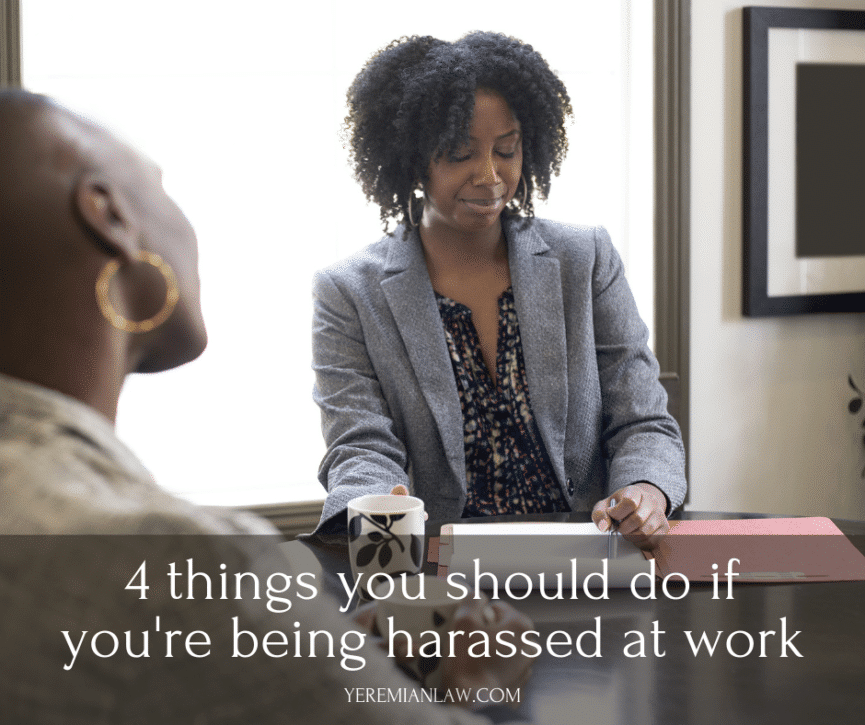If you’re being harassed at work for a discriminatory reason, you don’t have to take it – you have legal options. This guide explains the four things you should do if you’re being harassed (and why).
4 Things You Should Do if You’re Being Harassed at Work
Workplace harassment takes many forms, and sometimes it’s not illegal (such as in the case of well-intentioned teasing). However, it becomes illegal when it’s so severe or pervasive that it creates a hostile or abusive work environment where it’s impossible for you to perform your job. One incident can be so severe that it creates that type of work environment, or multiple incidents can pile onto each other and create that type of work environment. In either event, you don’t have to tolerate the harassment.
Here are four steps you can – and should – take if you’re being harassed at work:
- Document what’s happening to you.
- Tell someone.
- Get help from an attorney.
- File a complaint.
Here’s a closer look at each.
Related: Gender identity/gender expression discrimination and harassment
Step 1 if You’re Being Harassed at Work: Document What’s Happening to You
Keep detailed records of what’s going on in your situation. Include notes on who said or did what, where the events took place, and who may have witnessed it. Always include times and dates, and keep your notes in chronological order so that you can look back on them if you need to.
Save emails, text messages, photos, handwritten notes and other documentation that could contribute to your harassment case.
Related: What constitutes harassment in California?
Step 2 if You’re Being Harassed at Work: Tell Someone
If you feel safe doing so, tell your harasser to stop. Sometimes people don’t understand how unwelcome their actions are, and in some cases, simply speaking up will end the harassment. If you don’t feel comfortable talking to the person or people harassing you, it’s okay to ask someone you trust to talk to them.
However, some harassers know that their conduct is offensive, inappropriate and unwelcome – and they simply don’t care. If that’s the case in your situation, go directly to your supervisor. (And if your supervisor is the problem, go to your supervisor’s supervisor.)
You can also talk to your company’s human resources department or personnel office. If you have a union representative, you should bring the matter to their attention, as well.
Many companies have specific grievance procedures. You can usually find out how the company wants employees to report harassment by reading through your employee handbook, checking the company’s website or looking for posters near break areas in your workplace. If you aren’t sure, talk to your supervisor – or have someone you trust talk to your supervisor – to find out what steps you should take to report the problem to the company.
Remember: An employer can’t do its legal duty to stop the harassment if it’s not aware that the harassment is happening.
Step 3 if You’re Being Harassed at Work: Get Help From an Attorney
You always have the right to talk to an attorney about the issues you’re experiencing. In fact, you can go straight to an attorney as soon as you experience harassment – you don’t have to wait until you’ve filed an official complaint with your employer.
Your attorney will help you understand your options and explain what steps you can take. If your employer knows about the harassment and has failed to stop it, you may be able to take your employer to court.
Related: Different types of workplace harassment
Step 4 if You’re Being Harassed at Work: File a Complaint
You can take action by filing a complaint with the California Department of Fair Employment and Housing, or DFEH. You can also file a complaint with the Equal Employment Opportunity Commission, or EEOC. You don’t need to file a complaint with both agencies; after you file it with one, the other is circled into the loop.
Do You Need to Talk to an Attorney About Being Harassed at Work?
If you’re being harassed at work and want to talk to a discrimination attorney in Los Angeles about your options, call us at 818-230-8380 or fill out the form below. We’ll be happy to schedule a free consultation where you can ask questions and get the legal advice you need to start moving forward.




